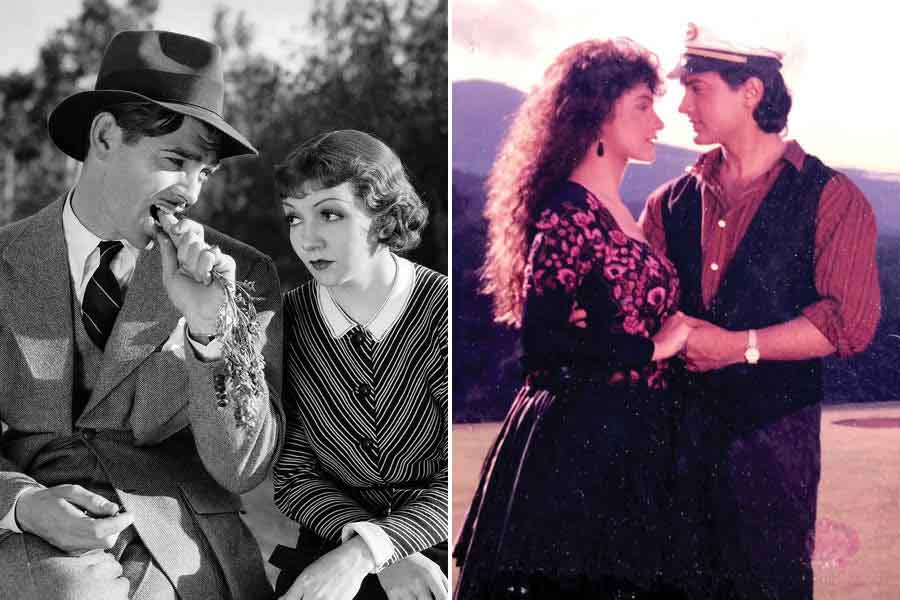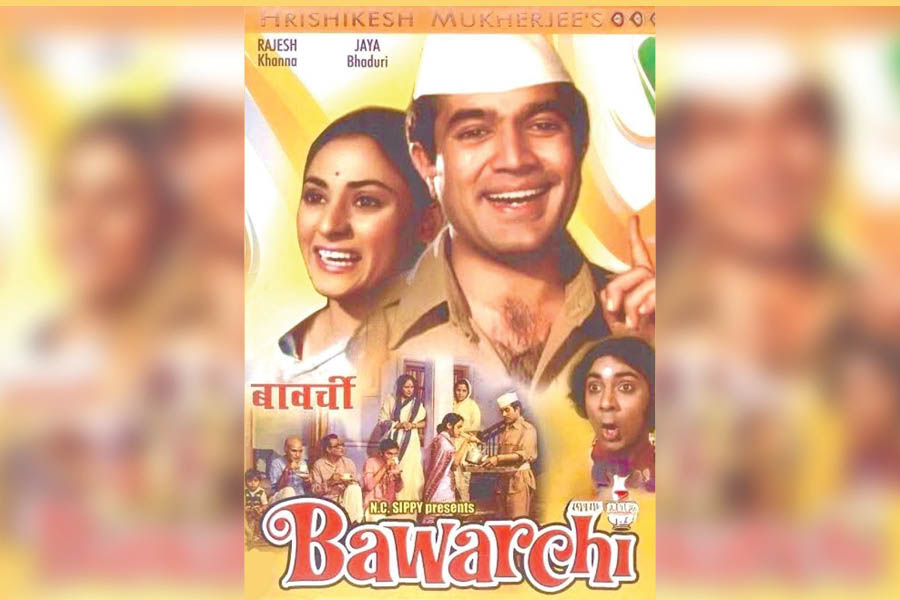A remake of Bawarchi! In effect a remake of a remake. Every few months there’s an announcement of a cult favourite being brought to the slaughterhouse of remakes that sends a shiver down my film-loving spine. I have held my breath every time I have heard some smart operator in Bollywood out to remake Amar Akbar Anthony. We have seen where remakes of Sholay, Karz, Zanjeer, Angoor and other memorable films have gone. And yet, filmmakers often revisit classic stories, ostensibly to present them in a new light. So much so, the remake is a bona fide genre of its own now.
While most Bollywood attempts at remakes have failed miserably, both commercially and creatively, there are a few that have not only measured up to the original but have in fact bettered it at times. Here are some of the best of the best from English and Bengali films.
FROM ENGLISH
Main Azaad Hoon / Meet John Doe
Without a doubt, this is one of the best remakes Hindi cinema has ever had, in fact, a rare instance when a Hindi remake has bettered the original. Frank Capra’s Meet John Doe is one more exploration of the Everyman protagonist of many of the legendary filmmaker’s outings. Tinnu Anand’s 1989 remake came at a time of great political and personal turmoil for Amitabh Bachchan, and in the wake of the critical and box-office disasters Gangaa Jamunaa Saraswati, Toofan and Jadugar, went some way to salvage the star’s image.
However, the real star of Main Azaad Hoon is its writer Javed Akhtar, who changes the original’s social messaging into a political one. With pungent dialogues that take apart the chicanery of politicians and the media, a string of strong supporting performances by Shabana Azmi, Annu Kapoor, Manohar Singh and Ajit Vachani, and incorporating the star’s personal experiences during his stint as a politician (the dirty drinking water episode, for example, which is played masterfully), Main Azaad Hoon is as contemporary now as it was 35 years ago. It is in the way the film ends that it scores over the original most of all. And of course there is Kaifi Azmi’s clarion call, ‘Kitne baazu kitne sar’ rendered brilliantly by Amitabh Bachchan.
Dil Hai Ke Manta Nahin / It Happened One Night
This Frank Capra film remains a perennial favourite with critics and audiences as one of the greatest romantic comedies ever made. However, I have always enjoyed Dil Hai Ke Manta Nahin more, its one song too many notwithstanding. Aamir Khan and Pooja Bhatt make a charming pair, and it’s a delight to see them spar and fall in love.
There are few Hindi films that use a classic song as eloquently to convey love as this one does with ‘Hum hai rahi pyar ke’ playing on the radio and the two waltzing to it in a shack in the rainfall and realising that the dynamics have shifted. They are admirably aided by Tiku Talsania and above all Anupam Kher in one of the best daddy roles in Hindi cinema – his exhortation to his daughter to run away from her wedding is one of the enduring images of the films of the era.
Manorama Six Feet Under / Chinatown
Navdeep Singh deserves praise for even thinking of adapting what is without a doubt among the very best of thrillers ever made. Roman Polanski’s Chinatown is a cinematic milestone and Navdeep Singh’s achievement lies in what he does with his remake, transposing the dry vistas of southern California to the barren landscape of Rajasthan, and rendering a very nuanced and intelligent take on the original. Extremely well-acted by Abhay Deol, this is a remake that almost manages to do the impossible — hold its own against an original that is a benchmark in cinematic brilliance.
Satte Pe Satta / Seven Brides for Seven Brothers
Another instance where I enjoyed the remake more than the original. The 90-minute original, directed by Stanley Donen, is one of the finest musicals ever but Satte Pe Satta goes one better, thanks primarily to RD Burman’s electrifying score. A series of wonderful set pieces – the ‘chain kuli ki main kuli’ fight in the speakeasy, the musical competition ‘Pariyon ka mela hai’, the kidnapping of the brides with ‘Pyaar hamein’, Amitabh Bachchan’s drunken scene with Amjad Khan’s brilliant reactions – make this one of the great entertainers, not to mention Bachchan’s double act as Babu with that mind-blowing background score.
FROM BENGALI
Chupke Chupke / Chhadmabeshi
Despite Uttam Kumar and its songs, Chhadmabeshi is not a patch on Hrishikesh Mukherjee’s laugh riot. Chupke Chupke scores over Chhadmabeshi primarily thanks to its writing. The source material is the same – Upendranath Ganguly’s story. However, it is Gulzar’s feel for dialogue that makes Chupke Chupke a winner.
Chhadmabeshi finds its groove only in the later portions but here too Chupke Chupke runs with it with two memorable comic acts by Amitabh Bachchan and Jaya Bhaduri. Then there is the classic cameo, which puts the debate beyond argument: Keshto Mukherjee’s as James D’Costa, the ‘poet’ driver at a loss for rhyming kafiyas (though Jahar Ray is never unfunny, he simply does not have an ‘Aaj baagh mein khilenga’ moment).
Bemisaal / Ami Se O Sakha
Though Bemisaal scores over the original (directed by Mangal Chakravarty) on a number of parameters, Amitabh Bachchan’s performance alone makes it first-past-the-post. For the sheer range of emotions on display between the two characters (Sudhir and Adhir) he essays, he is leagues ahead of what Uttam Kumar manages. The lover, the flirtatious charmer, the angry young man with an almost childlike petulance, and above all his intonation of ‘sakhi’ to Uttam Kumar’s rather staid ‘Madam’ – Bachchan simply towers over Uttam Kumar. There’s a dark side to the character, an edginess that Bachchan brings out and that makes Bemisaal riveting. Then you have a first-rate Rakhee performance and RD Burman’s memorable score. Rahi Masoom Raza’s dialogues and Sachin Bhowmik’s screenplay are the two other components that enable Bemisaal to emerge as the more layered, more engaging film.
Angoor / Bhranti Bilas
Like Chupke Chupke and Bemisaal, it is the writing that makes Angoor the hands-down winner. Manu Sen’s Bhranti Bilas, based on Vidyasagar’s story derived from Shakespeare’s The Comedy of Errors, is great fun, with a scintillating Sabitri Chatterjee turn. However, in Angoor it is Gulzar who is the star, making a madcap adventure of Shakespeare’s tale of mistaken identities that the original cannot keep pace with.
There is not a moment in the Bengali version that can hold a candle to Gulzar’s play with words and feel for the comic. Not to mention Deven Verma in, arguably, the most memorable double role in Hindi films ever (the one instance when even a comic genius like Bhanu Bandopadhyay is relegated to second place). If there’s one facet that puts Angoor miles ahead of its Bengali original, it is Deven Verma, who even gets a full song to himself and floors you with his comic timing even in that.
Padosan / Pasher Badi
Sudhir Mukherjee’s original is now more remembered for Sabitri Chatterjee’s star-making performance and Bhanu Bandopadhyay’s stellar act as the effeminate singer-suitor. Despite its laugh-out-loud wordplay, Pasher Badi pales in comparison to Padosan, the latter driven primarily by Kishore Kumar’s paan-chewing act and a sustained lunacy that he imbues the film, along with a terrific score by RD Burman.
(Shantanu Ray Chaudhuri is a film and music buff, editor, publisher, film critic and writer)











